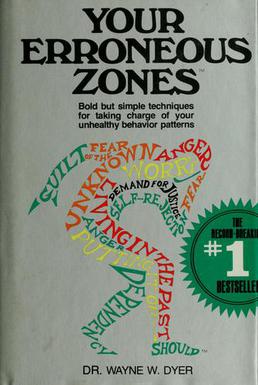Your Erroneous Zones
1976 book by Wayne Dyer From Wikipedia, the free encyclopedia
Your Erroneous Zones is the first self-help book written by Wayne Dyer and first issued by Funk & Wagnalls publishers in April 1976.[1]
 | |
| Author | Wayne Dyer |
|---|---|
| Subject | Psychology |
Publication date | 1976 |
| ISBN | 0-308-10228-2 |
It is one of the best-selling books of all time, with an estimated 100 million copies sold.[2] The book spent 64 weeks on The New York Times bestseller list through November 13, 1977,[3] including a spot at number one on the week of May 8, 1977.[4]
Contents
Summarize
Perspective
Chapter I. Taking Charge of Yourself.
In this Chapter Dyer takes note of the brevity of life. He asserts that feelings are reactions you choose to have. He points out that learning not to be unhappy is a tough assignment as habits can only be changed by patience and persistence. Choice is our great power. He introduces for the first time the concept of immobilisation and gives a checklist of instances. Living in the present moment (a habit) is all important.[5]
Chapter II. Self Love.
The sub heading of this Chapter gives a basic idea/attitude upon which the whole of this books message depends, our personal habitual feeling of self worth. "Love yourself, a lot". For effective living Dyer asserts that "Self love is (must become) a given". "Under no circumstances is self hate better than Self Love" [6]
Chapter III. You Do Not Need Their Approval
In this Chapter Dyer gives "Historical precedents for Approval seeking" and notes the "profusion of cultural approval seeking messages". Early Childhood, School, the Church, the Government, Popular Songs, Television Commercials are all dealt with. Dyer uses the phrase "Coaxing Approval Seeking down the stairs a step at a time" to describe the change in habit needed for us to more effectively deal with the hindrance of approval seeking. [7]
Chapter IV Breaking Free From the Past.
In the sub heading of this chapter Dyer uses a phrase which gives the main thrust of the Chapter. "You are what you choose today, not what you have chosen before". He gives a list of 35 negative "I'ms" e.g. "I'm poor at Mathematics". The Chapter continues with "How Those "I'ms got started". Another constant thread through this chapter and the rest of the book are the Neurotic Dividends of Erroneous Zones. The "I'm" circle of thought is illustrated. Strategies to rid oneself of this ineffective behaviour are listed, including eliminating one I'm for one day. Final thoughts highlight the great benefit of continuous learning and the only good I'm is "I'm - an I'm exorcist -and I like it".
Chapter V. The Useless Emotions- Guilt and Worry.
These emotions are classified as "useless" by Dyer. Dyer places them on a continuum. Guilt is useless in regard to changing past events, worry useless in regard to the outcome of future events. Dyer states that worrying which "immobilizes" us in the present is not to be confused with careful planning which is a rational and effective thing to do. The sources of our guilt and worry habits Dyer lists and they are similar in both cases. Parents, spouses, children, school, Church, eating, sex. As in other chapters Dyer list the pay offs for choosing these emotions. Strategies for eliminating these damaging emotions are given. Finally the critical worth of "present moment" living is restated as being the key to becoming more effective with regard to guilt and worry.
Chapter VI. Exploring the Unknown.
Dyer begins by noting how our early training makes us "safety experts", a big loss, as the mysterious is the source of all growth and excitement. Dyer urges us to create habits of openness to new experiences, avoiding rigidity, prejudice and "always having a plan". He then considers one of the constant and central themes of the whole book "Security: Internal and External Varieties". Fear of failure is next considered and the benefit of the effective habit of an internal sense of self worth is highlighted. As in other chapters Dyer list typical examples of this particular erroneous zone, supposed Psychological benefits and strategies to overcome it. Finally the great benefit to Humanity of the explorers and inventors is noted. An appropriate quote From Robert Frost is given.
Criticism
Psychotherapist Albert Ellis writes that Dyer's book Your Erroneous Zones is probably "the worst example" of plagiarism of Ellis's Rational Emotive Behavioral Therapy (REBT).[8] In a 1985 letter to Dyer, Ellis claims that Dyer had participated in a workshop Ellis gave on REBT before Dyer published his book, in which Dyer appeared to understand REBT very well. Wayne Dyer probably had a fundamental understanding before continuing to explore this idea. Ellis adds that "300 or more people have voluntarily told me... that [the book] was clearly derived from REBT." Dyer never apologized or expressed any sense of wrongdoing. Ellis admonishes Dyer for unethically and unprofessionally not giving Ellis credit as the book's primary source, but expressed overall gratitude for Dyer's work, writing: "Your Erroneous Zones is a good book, ... it has helped a great number of people, and ... it outlines the main principles of REBT quite well,... with great simplicity and clarity."[9]
Dyer's book Your Erroneous Zones makes a minor mention of Albert Ellis on page 148.
References
Wikiwand - on
Seamless Wikipedia browsing. On steroids.
